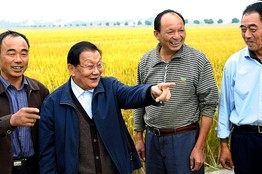(单词翻译:单击)

Wu Renbao took a vague concept─'capitalism with Chinese characteristics'─as the blueprint to turn a farm community into what is now known in China as the country's richest village.
吴仁宝以“有中国特色的资本主义”这一模糊的概念为蓝图,把一个农业社区变成了如今中国公认的首富村。
Mr. Wu, who died of lung cancer at age 84 on Monday, responded to China's market overhauls in the early 1980s with a politically savvy strategy to charge up the economy of Huaxi, the village in eastern Jiangsu province that he headed as Communist Party secretary. While Mr. Wu kept his party bosses happy by swearing allegiance to socialism, he turned rice and pig farmers into millionaires.
周一,吴仁宝因肺癌去世,终年84岁。上世纪80年代初,江苏省东部华西村的原党委书记吴仁宝以一种具有政治智慧的方式回应了中国的市场改革,进而促成了华西村的经济腾飞。吴仁宝通过发誓忠诚于社会主义让他的上级满意,与此同时,他把种水稻和养猪的农民变成了百万富翁。
For Chinese leaders unsure of how to embrace market economics without abandoning the Communist party, the village 85 miles northwest of Shanghai illustrated a working model. His approach mirrored that of Chinese leader Deng Xiaoping, who sparked China's post-Mao Zedong economic boom with imprecise concepts such as his famous 'capitalism with Chinese characteristics.'
对于那些不确定如何在坚持共产党领导的前提下拥抱市场经济的中国领导人来说,位于上海西北部85英里(合137公里)的华西村代表了一种可行的模式。吴仁宝的方法与中国领导人邓小平的方法相同。邓小平曾经以一些模糊的概念,比如“有中国特色的社会主义”,开启了后毛泽东时代中国的经济繁荣。
Both were pragmatic men, short in stature, who were criticized during Mao's time, and neither felt nostalgia for his era. 'I raised cattle and fed pigs during the day and took care of the disabled son of my landlord in the morning and night. All this hard work earned me 20 kilos of rice a year,' Mr. Wu told a Chinese magazine two years ago.
两个人都是实干家,个子都不高,都在毛泽东时代受到过迫害,两人都没有对毛泽东时代有过怀旧情绪。吴仁宝两年前在接受一家中国杂志采访时说:我白天放牛喂猪,早晚照顾地主家瘫痪在床的儿子。一年下来可以赚到40斤米。
Mr. Wu pivoted Huaxi's economy from farming toward manufacturing and trade, with ventures in steelmaking, then liquor, banking and tourism. For political cover, he took a page from Mao and labeled the assets and income as collective property of the villagers.
吴仁宝将华西村的经济从农业转变为制造业和商业,建起冶金厂,并随后发展了酿酒、银行和旅游业。作为一种政治说法,他按照毛泽东的方式,把这些资产和收入贴上了村民集体财富的标签。
Today, Huaxi's around 1,600 original residents jointly claim title to the fruits of its three decades of economic growth, including last year's 58 billion yuan ($9.6 billion) in local gross domestic product, according to town officials.
如今,华西村的大约1,600名原有村民是30年经济发展成果的共同所有者。村里的官员说,去年华西村的GDP达到人民币580亿元(合96亿美元)。
'Socialism means 98 out of 100 people are happy,' Mr. Wu told Chinese media in 2006. 'You can't do much about the other two.'
吴仁宝2006年对中国媒体说:100个人里面有98个人幸福,就是社会主义。剩下的那两个人是自己不要幸福,没办法。
Chih-Jou Jay Chen, a researcher at Taiwan's Academia Sinica, said senior Chinese leaders in the 1990s also saw Mr. Wu's careful approach as a potential alternative should market economics fail. 'They wanted to have some socialist models or some communist models to be safe,' said Mr. Chen.
台湾中央研究院(Academia Sinica)的研究员陈志柔(Chih-Jou Jay Chen)说,上世纪90年代的中国高层领导人也将吴仁宝谨慎的做法视为市场经济失败后可能的替代品。陈志柔说,处于安全考量,他们想要有一些社会主义模式或共产主义模式。
Huaxi holds special status in a nation aspiring to wealth. Most households boast high per capita income and a car to drive. In 2011, the town's 50th anniversary gift to itself was a pure-gold ox that media said weighed a ton. It is displayed on the 60th floor of a five-star hotel nicknamed the Farmer's Apartments that is topped with a golf-ball-shaped room. It is a highlight of the town's free helicopter tours.
在渴望致富的中国,华西村有其特殊地位。该村的大多数家庭人均收入都很高,而且都有车开。2011年华西村建村50周年,该村送给自己的礼物是一头金牛。媒体报道说造这头牛耗费了一吨黄金。金牛放在该村一座五星级酒店的60层。酒店又被称作“农民公寓”,最高层是个像高尔夫球式的房间。这个酒店是华西村免费直升机观光的重要景点之一。
'I was shocked, and everyone in the village is saddened by the news of his death,' said Wang Lijuan, a manager at the Huaxi Tourism Agency. 'Mr. Wu is widely respected by us.' Mr. Wu's death also got attention in national media on Tuesday, as broadcasters used the village's transformation as a reminder of strides China has made.
华西旅行社(Huaxi Tourism Agency)经理王丽娟(音)说:听到他去世的消息我很震惊,村里所有人都感到难过,吴仁宝受到我们大家的普遍尊敬。吴仁宝的去世周二还引起了中国国家媒体的关注,电视台以华西村的巨大转变提醒人们记住中国取得的进步。
There are limits to the generosity of Huaxi's community capitalism. The collective that stakes claim to Huaxi's assets is a tiny subset of the 35,000 people who live there, consisting of residents who hold an official government identity card from the original village. Ms. Wang said her salary isn't supplemented with dividends enjoyed by the original residents.
华西村社区资本主义的慷慨也是有限的。声称拥有华西村资产的这个集体指的是生活在那里的3.5万人中的很小一部分,由那些持有原有村官方身份证的居民组成。王丽娟说,她除工资外没有红利,而华西村的原有村民就有。
Mr. Wu had a knack for selling hard-nosed business decisions as generosity. Rather than sacrifice economic growth by permitting local workers vacation time, he decided in the 1990s to bring the world to Huaxi in the form of knockoffs of the White House, Paris's Arc de Triomphe and the Great Wall.
吴仁宝有能力以一种慷慨的方式来推销他的精明商业决策。由于考虑到让村民外出度假可能会影响华西村的经济增长,上世纪90年代他决定复制美国白宫、巴黎凯旋门和北京长城等建筑,从而让村民见识到外面的世界。
He combined strict political control with get-rich-quick economics, according to Wenxian Zhang, a professor at Rollins College in Winter Park, Fla., 'which is probably better described as the 'socialist market economy with Chinese characteristics.'' Other analysts deride Huaxi's patriarchal, migrant-dependent system as feudalism.
美国佛罗里达州温特帕克的罗林斯学院(Rollins College)教授张文献表示,吴仁宝将严格的政治管控和快速致富的经济学结合在一起,也许将其称作带有中国特色的社会主义市场经济更为贴切。也有分析人士嘲讽华西村这种家长式作风、依赖农民工的制度,说这是封建主义。
Though Mr. Wu remained active in party affairs, he retired as the village's party chief in 2003 and relinquished his key positions to a son, Wu Xie'en. Shares representing village assets known as Jiangsu Huaxicun Co. 000936.SZ +0.26% edged up 0.3% on Tuesday on the stock exchange in the city of Shenzhen.
虽然吴仁宝当时在处理党内事务方面很活跃,但2003年他卸去了华西村党委书记一职,将自己担任的一些关键职位交给了儿子吴协恩。代表该村资产的江苏华西村股份有限公司(Jiangsu Huaxicun Co.)的股票周二在深圳交易所略微上涨了0.3%。
His funeral is scheduled for the auspicious time of 8:08 a.m. on Friday, said a spokesman for the town Tuesday.
华西村发言人周二说,吴仁宝的葬礼安排在周五上午8点零8分的吉时举行。
One of his rules to sustain Huaxi's riches: Anyone who leaves town loses all title to the money.
吴仁宝维持华西村财富的规定之一是:任何人只要离开该村,就会失去所有财产。


